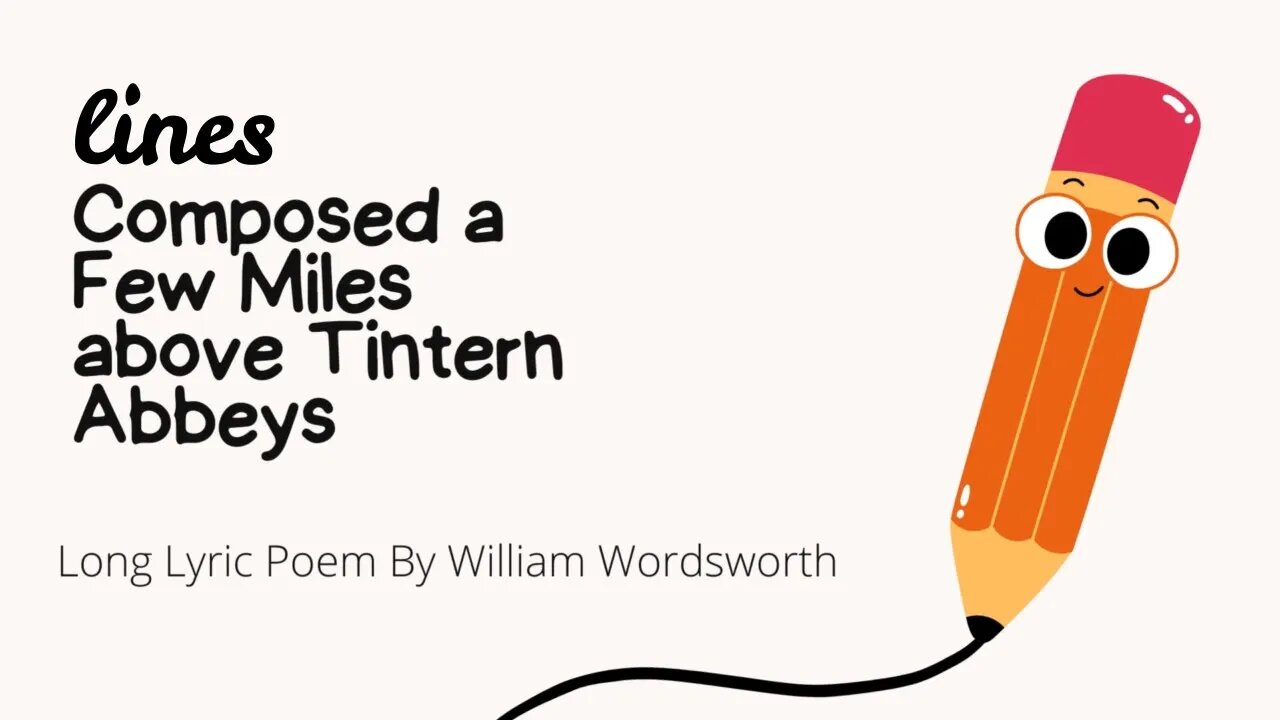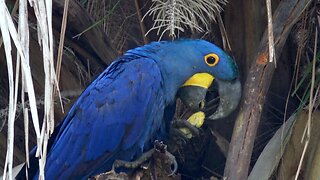Premium Only Content

Lines Composed a Few Miles above Tintern Abbey by William Wordsworth Analysis
"Lines Composed a Few Miles above Tintern Abbey" is a long lyric poem by William Wordsworth, written in 1798 and revised in 1799. The poem reflects on the poet's return to the Wye Valley, near Tintern Abbey, after a five-year absence. The speaker, who is older and wiser, shares his thoughts and feelings about the transformative power of nature and the lasting impact it has had on his life. The poem consists of five sections of varying length, written in blank verse, with no set rhyme scheme.
In the first section, the speaker describes the picturesque landscape of the Wye Valley and how its beauty stirs his emotions. He recalls the sense of joy and freedom he felt during his previous visits and how those memories continue to influence him even when he is absent from the place.
The second section explores the significance of nature in shaping the speaker's character and moral sensibility. He credits nature with bestowing upon him a deeper appreciation of life, a sense of unity with the universe, and a guiding moral force.
In the third section, the speaker discusses the power of memory and how his experiences in nature have become a source of comfort and strength during times of difficulty.
The fourth section focuses on the impact of nature on the speaker's younger sister, Dorothy. He believes that her exposure to the beauty of the Wye Valley will have a similar transformative effect on her character and outlook.
In the final section, the speaker expresses his gratitude to nature for its continuous influence on his life and reaffirms his commitment to cherishing these memories and experiences.
Themes.
Nature's Influence on the Human Mind. The poem explores how nature's beauty and tranquility can have a profound impact on the human mind, shaping one's thoughts, emotions, and moral sensibility.
The Power of Memory. The poem highlights the significance of memory in sustaining the emotional and spiritual effects of past encounters with nature.
Transcendence and Spirituality. Nature serves as a conduit for the speaker's spiritual connection to the universe and a source of transcendent experiences.
Time and Change. The poem contemplates the passage of time and the changes that occur in both the natural world and in the speaker's perception of it.
Symbols.
Tintern Abbey symbolizes the passage of time and change, as well as the connection between past and present experiences.
Nature and the Wye Valley symbolize the beauty and tranquility of the natural world and its transformative power on the human mind and soul.
Literary Devices.
Imagery. The poem is rich in vivid visual imagery, describing the beauty of the natural landscape and its effect on the speaker's emotions.
Enjambment. Wordsworth uses enjambment, or the continuation of a sentence beyond a line break, to create a flowing and uninterrupted rhythm.
Alliteration. The repetition of consonant sounds, such as "wild and woodland" and "sweet, wild music," adds musicality and emphasis to certain phrases.
Anaphora. Wordsworth uses repetition of the phrase "These beauteous forms" to emphasize the lasting impact of nature on his mind and soul.
#WilliamWordsworth
#TinternAbbeyPoem
#NaturePoetry
#Transcendentalism
#RomanticPoetry
#PoetryAnalysis
#EnglishLiterature
#WordsworthianIdeas
-
 LIVE
LIVE
FyrBorne
8 hours ago🔴Warzone M&K Sniping: On the Hunt For The Next Fun Builds
22 watching -
 7:11
7:11
MudandMunitions
11 hours agoNY Legal, Still LETHAL! Colt M4 + Griffin Armament GPS3X Prism Sight! NIGHT SHOOT
2.55K3 -
 2:11
2:11
WildCreatures
2 days ago $0.32 earnedBrilliant Blue Hyacinth Macaw Eats Nuts With Impressive Dexterity
4.52K4 -
 29:45
29:45
DeVory Darkins
14 hours ago $4.35 earnedDemocrat Governor suffers EMBARRASSING LOSS to Trump as ICE takes Garcia into custody
8.99K54 -
 24:50
24:50
Bitcoin.com
15 hours agoEthereum hit an ATH this weekend | The Weekly Recap for Aug 25
8.44K -
 56:27
56:27
Actual Justice Warrior
14 hours agoAnti-White Celebrity DESTROYED On Jubilee
10.5K9 -
 19:44
19:44
itsSeanDaniel
1 day agoLiberal Karen INSTANTLY REGRETS Interrupting Putin's Right Hand Man
5.63K9 -
 1:20:38
1:20:38
BlaireWhite
2 days agoThe Dark Truth About UFOs: Why The Government Is Lying
14.8K11 -
 2:10:32
2:10:32
Side Scrollers Podcast
20 hours agoStreamer Nearly Beats A Man to Death on Stream + Twitch Viewership PLUMMETS + More | Side Scrollers
14.5K7 -
 13:09
13:09
Forrest Galante
1 day agoWildlife Expert Reacts To Deadly Australian Animal TikToks
88.1K14